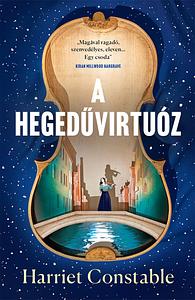You need to sign in or sign up before continuing.
Take a photo of a barcode or cover
The Instrumentalist is a fictional story woven from true events, set against the vibrant yet oppressive backdrop of 1700s Venice. Through the lens of Anna Maria, an orphan raised at the Ospedale della Pietà, the novel explores the erasure of women's contributions in history and the harsh realities of survival in a patriarchal society.
Anna Maria, abandoned as a baby, finds a semblance of safety and education within the walls of the Pietà. But as she matures, she becomes acutely aware of the disparities that could easily make her disappear if she doesn’t prove herself indispensable. Under the guidance of her maestro, she sees a path to securing her future, though it may come at a steep personal cost.
This novel is fast-paced—I devoured it in a single day. Anna Maria's character is fiercely ambitious, even arrogant at times, but in a world where women are both dispensable and invisible, her drive is understandable, if not entirely sympathetic. However, I found myself longing for a more immersive depiction of Venice during this period. The modern tone of the writing, while accessible, sometimes detracts from the historical atmosphere that could have enriched the story further.
Thank you to Simon and Schuster for the free copy for review.
Content Warnings: child abandonment, descriptions of body injuries, subtle hints of grooming.
Anna Maria, abandoned as a baby, finds a semblance of safety and education within the walls of the Pietà. But as she matures, she becomes acutely aware of the disparities that could easily make her disappear if she doesn’t prove herself indispensable. Under the guidance of her maestro, she sees a path to securing her future, though it may come at a steep personal cost.
This novel is fast-paced—I devoured it in a single day. Anna Maria's character is fiercely ambitious, even arrogant at times, but in a world where women are both dispensable and invisible, her drive is understandable, if not entirely sympathetic. However, I found myself longing for a more immersive depiction of Venice during this period. The modern tone of the writing, while accessible, sometimes detracts from the historical atmosphere that could have enriched the story further.
Thank you to Simon and Schuster for the free copy for review.
Content Warnings: child abandonment, descriptions of body injuries, subtle hints of grooming.
adventurous
emotional
hopeful
informative
inspiring
reflective
fast-paced
adventurous
dark
emotional
hopeful
inspiring
tense
fast-paced
Plot or Character Driven:
A mix
Strong character development:
Yes
Loveable characters:
Yes
Diverse cast of characters:
Yes
Flaws of characters a main focus:
Yes
emotional
hopeful
informative
mysterious
reflective
medium-paced
Plot or Character Driven:
Character
Strong character development:
Yes
Loveable characters:
Yes
Diverse cast of characters:
No
Flaws of characters a main focus:
Yes
5/10 - Anna Maria is an 8-year-old orphan in Venice in 1704. She is determined to become the greatest violinist and composer the world has seen. When the maestro selects her as his star pupil, she struggles to continue to please him while threatening to eclipse his talent.
I loved the vivid descriptions within this novel – describing Venice, the buildings, and the stained glass windows. But I absolutely loved the way Anna Maira describes the music, the vivid colours – perfection.
Aside from that, the reality of the story was too far-fetched. There is no way an 8-year-old orphan would be able to make the demands that Anna Maria does, have the attitude that Anna Maria does.
Emilia Clarke is the voice actor for this audiobook – utter perfection.
I loved the vivid descriptions within this novel – describing Venice, the buildings, and the stained glass windows. But I absolutely loved the way Anna Maira describes the music, the vivid colours – perfection.
Aside from that, the reality of the story was too far-fetched. There is no way an 8-year-old orphan would be able to make the demands that Anna Maria does, have the attitude that Anna Maria does.
Emilia Clarke is the voice actor for this audiobook – utter perfection.
Thank you to Bloomsbury Publishing and Harriet Constable for gifting me a physical proof copy of the Instrumentalist in exchange for a fair and honest review. History is such an evocative subject – so much mystery about that past intrigues our imagination about how things were or what might have been. We only have the voices of the infamous, the victors, and the powerful to share their stories – blurring fact and fiction until the truth lies in the cracks about those forgotten by history.
Harriet Constable has crafted a fascinating, thought-provoking historical retelling of Antonio Vivaldi and his gifted pupils of Ospedale della Pieta orphanage. Asking the question 'What if' his orphan students were more than his muses – could his most infamous student, Anna Maria della Pieta, have helped construct or even written some of the maestro's work for which he took the credit? I found the idea plausible that others might have usurped her work before she earned fame and recognition. It is impossible to know if Anna was involved in or influenced Vivaldi's work. What a thrilling and juicy idea to imagine how it all might have played out.
Harriet Constable's descriptive writing vividly brings to life imagery of 18th-century Venice with the sights, sounds, and smells of the city of stark contrasts between the wealth palaces and the poverty of back street brothels and the simplicity of religious nunneries and their orphanages. The pacing is a little slow around Anna's younger years as she becomes obsessed with her music at the exclusion of all else in her life; things ramp up as she earns her seat in the Orchestra and explores her abilities in the composition of music as well as her prodigy ability to play the violin in the Ospedale della Pieta's celebrated Orchestra, the Figlie.
Anna's character is sometimes difficult to perceive as an authentic 18th-century girl or young woman who you'd expect to be meek and mild, given her upbringing by nuns in a religious orphanage. Anna is fierce, single-minded, cold, unfriendly to her peers, and driven by the desire for her music. She boasts some strong feminist vibes at the heart of her character in how she behaves and reacts, which makes the reader wonder if she had been so ruthlessly dedicated to her music and driven by ambition to be bold and stubborn. I found myself dwelling on this a lot while reading the story, but I couldn't help but see fear as a driver in her motivations. Music was a refuge and a means to escape the fate of her fellow orphans of being married off to the highest bidder. I found this portrayal of her believable and strong – Anna needed more than talent to bank on to achieve the recognition of maestro, go on to lead the Figlie, and teach music into her 80s back in the 1700s. She must have had gumption by the bucket load and a core of steel to have accomplished what she did and wield her extraordinary musical gift with the violin and so many other instruments.
An interesting historical fictional account that imagines who was the woman behind the musical protegee Anna Maria della Pieta might have been as she's been lost to history – only the memory of her life dedicated to the Orchestra, teaching, and musical talent has been recorded. Weaving a story with themes about what we sacrifice in pursuit of ambition and women's struggles to be recognised in the past within male-dominated societies
Harriet Constable has crafted a fascinating, thought-provoking historical retelling of Antonio Vivaldi and his gifted pupils of Ospedale della Pieta orphanage. Asking the question 'What if' his orphan students were more than his muses – could his most infamous student, Anna Maria della Pieta, have helped construct or even written some of the maestro's work for which he took the credit? I found the idea plausible that others might have usurped her work before she earned fame and recognition. It is impossible to know if Anna was involved in or influenced Vivaldi's work. What a thrilling and juicy idea to imagine how it all might have played out.
Harriet Constable's descriptive writing vividly brings to life imagery of 18th-century Venice with the sights, sounds, and smells of the city of stark contrasts between the wealth palaces and the poverty of back street brothels and the simplicity of religious nunneries and their orphanages. The pacing is a little slow around Anna's younger years as she becomes obsessed with her music at the exclusion of all else in her life; things ramp up as she earns her seat in the Orchestra and explores her abilities in the composition of music as well as her prodigy ability to play the violin in the Ospedale della Pieta's celebrated Orchestra, the Figlie.
Anna's character is sometimes difficult to perceive as an authentic 18th-century girl or young woman who you'd expect to be meek and mild, given her upbringing by nuns in a religious orphanage. Anna is fierce, single-minded, cold, unfriendly to her peers, and driven by the desire for her music. She boasts some strong feminist vibes at the heart of her character in how she behaves and reacts, which makes the reader wonder if she had been so ruthlessly dedicated to her music and driven by ambition to be bold and stubborn. I found myself dwelling on this a lot while reading the story, but I couldn't help but see fear as a driver in her motivations. Music was a refuge and a means to escape the fate of her fellow orphans of being married off to the highest bidder. I found this portrayal of her believable and strong – Anna needed more than talent to bank on to achieve the recognition of maestro, go on to lead the Figlie, and teach music into her 80s back in the 1700s. She must have had gumption by the bucket load and a core of steel to have accomplished what she did and wield her extraordinary musical gift with the violin and so many other instruments.
An interesting historical fictional account that imagines who was the woman behind the musical protegee Anna Maria della Pieta might have been as she's been lost to history – only the memory of her life dedicated to the Orchestra, teaching, and musical talent has been recorded. Weaving a story with themes about what we sacrifice in pursuit of ambition and women's struggles to be recognised in the past within male-dominated societies
emotional
inspiring
sad
fast-paced
Plot or Character Driven:
A mix
Strong character development:
Yes
Loveable characters:
Complicated
Flaws of characters a main focus:
Yes
emotional
hopeful
inspiring
reflective
medium-paced
emotional
inspiring
medium-paced
emotional
sad
tense
slow-paced
Plot or Character Driven:
Character
Strong character development:
Yes
Loveable characters:
Complicated
Flaws of characters a main focus:
Yes



